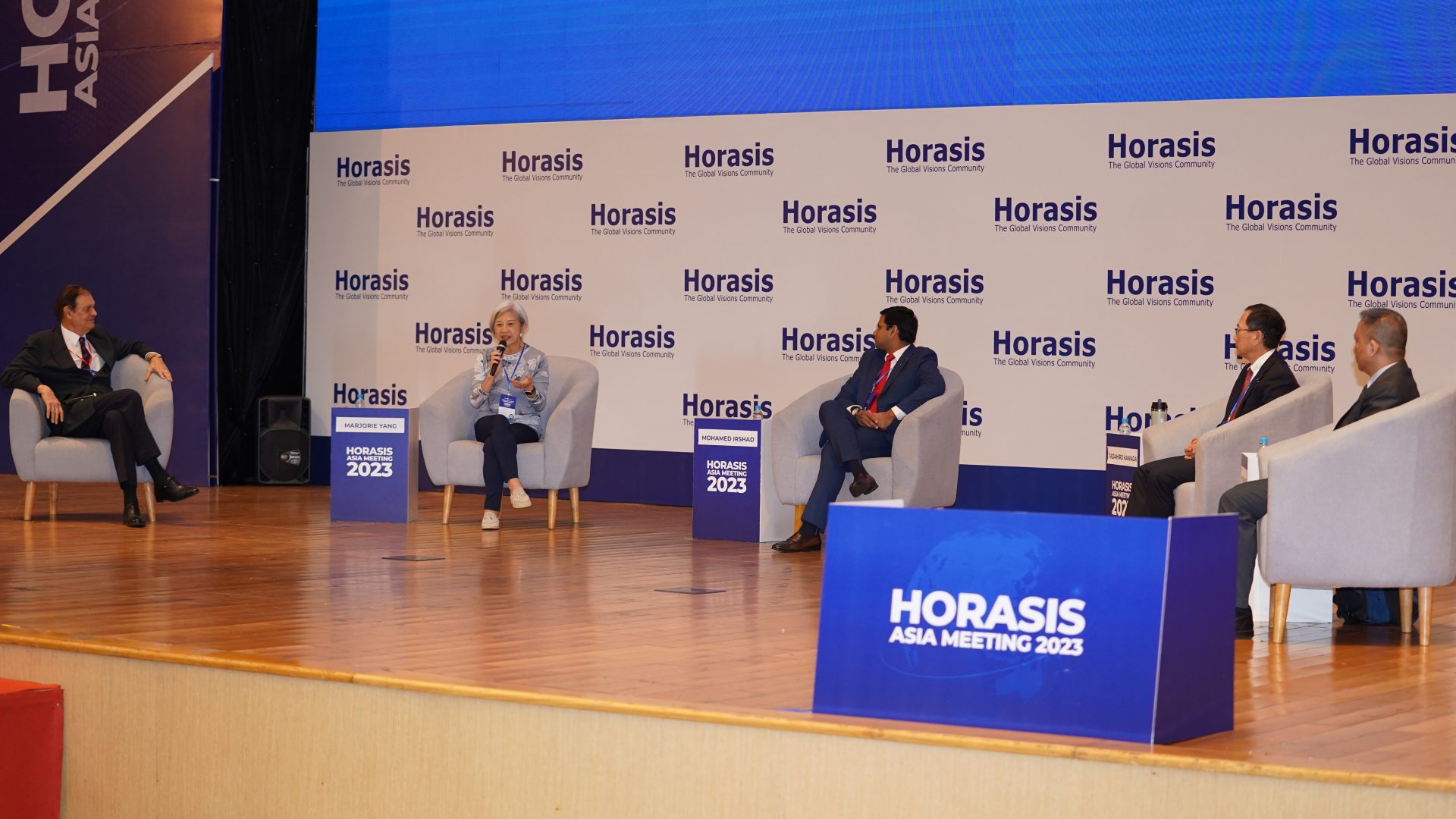Horasis Asia Meeting Meeting 2023 – Summary
The eighth Horasis Asia Meeting took place over 3-4th December in Bình Duong, Vietnam co-hosted by Binh Duong Province and Becamex IDC. The Horasis Asia Meeting has become the foremost annual meeting for Asia Pacific business leaders and their global counterparts. The event offers businesses and government officials a platform to discuss a wide range of issues related to the economy. The meeting assembled over 600 delegates from government, businesses and civil society world-wide.
Welcoming the delegates Huynh Thanh Dat, Minister of Science and Technology, Vietnam briefed the guests on the socio-economic situation of the province, particularly its gross regional domestic product (GRDP) that increased by 8.29% in the first 10 months of this year compared to the same period last year. Based on the fact that Bình Duongis one of Vietnam’s leading localities in terms of attracting foreign direct investment (FDI). As of December 2023, it had 4,076 investment projects from 65 countries and territories around the world with a total capital of over US$ 39.6 billion. Japan had run 339 validated projects, valued at nearly US$ 6 billion. Administratively we have found it is better to review, to quickly respond, and clearly instruct businesses how to process their applications, to limit processing time.
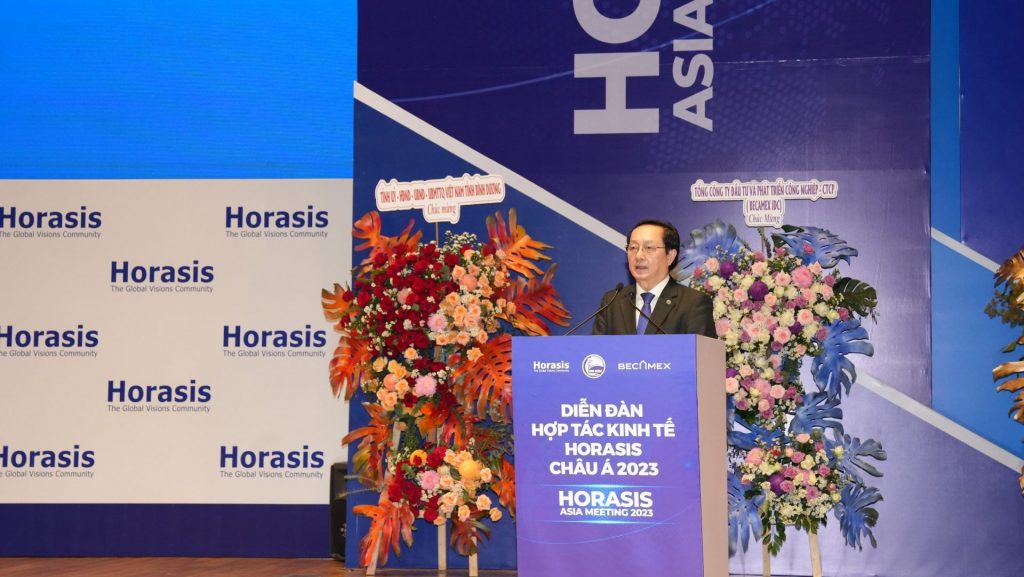
Huynh Thanh Dat, Minister of Science and Technology, Vietnam, speaking during the Grand Opening
Vo Van Minh, Chairman, Bình DuongProvince, Vietnam, highlighted the significance of this event, saying it will be an important international event in Bình Duong as the province has been recognized by the Intelligent Community Forum (ICF) as the Intelligent Community of the Year. John Jung, Chairman and Co-founder, Intelligent Community Forum, Canada said that the initial results in the implementation of the smart city project have created a highlight and foundation for Bình Duong province to continue to make breakthroughs in the next period. In particular, building a smart city and participating in international organizations such as ICF have contributed to extensively promoting Bình Duong’s image in the international arena. Charles Tang, President, Brazil China Chamber of Commerce, Brazil reminded the meeting that smart cities and how they are managed is not just top-down data collection and new policies, but a recognition people can really be at the center of this. Then, while discussing the Who and the How of the Asian Renascence, Roger King, Founder and Chairman, ODS Holdings Inc., Hong Kong said ‘Time is short’ it will be worrying if global leaders procrastinate – there is too much to do. But there are no shortcuts – we must work hard. Short time to the clarity of execution was emphasized by China said Ben Nelson, Chairman and Chief Executive Officer, Minerva Project, USA “It was because of cooperation and an era of globalization that 800 million people in China were lifted out of poverty.”
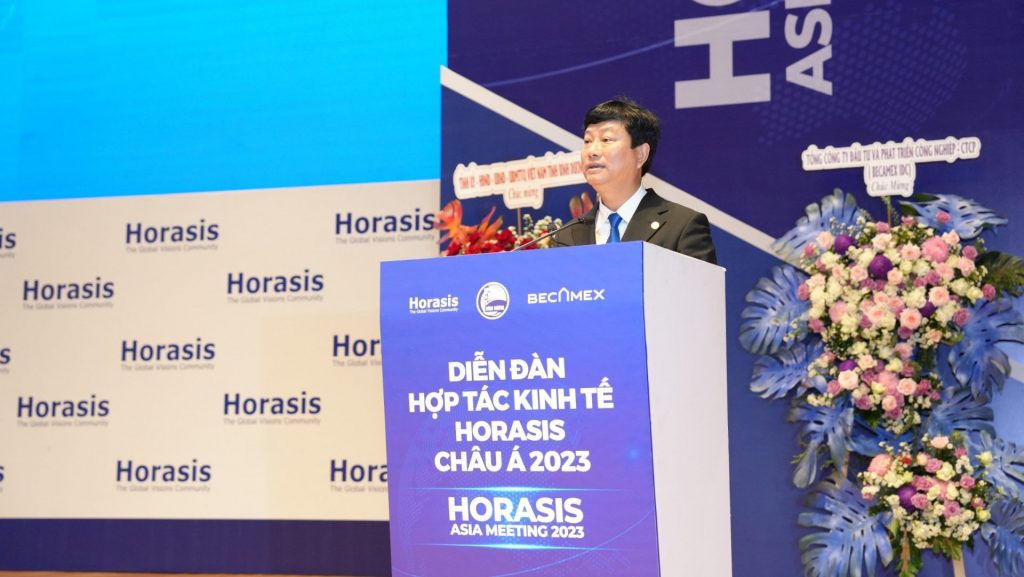
Vo Van Minh, Chairman, Binh Duong Province, Vietnam
Yet the capital of the region must be mobilized said Vo Xuan Vinh, Professor, Ho Chi Minh City University of Economics, Vietnam. Capital structure decisions are an important corporate behavior that draws strong interest from different stakeholders who must be convinced to invest. This is more important in emerging markets due to their unique legal, cultural and institutional characteristics. Mai An, Co-founder and President, IMT Solutions, Vietnam agreed – the first criterion given by investors is whether they have confidence when deciding to invest in that locality or not? Does that place and time help them do business sustainably? Thus, summarized Wang Huiyao, Founder, Center for China and Globalization: Former Counselor, China State Council, China “Asia will be the next economic powerhouse in terms of growth.” Despite the complex web of industrial policies, subsidies and commitments, particularly those by developed nations to their developing counterparts, the necessity for a collaborative approach to “de-risk” our planet is undeniable. It is incumbent on all nations to foster an environment conducive to finding solutions to this universal menace. The plenary chair, Richard David Hames, Founding Director, The Asian Foresight Institute, Thailand stated there must be a coherent view. There must be strategically relevant yet viable ‘whole system’ solutions for business and government in today’s society.
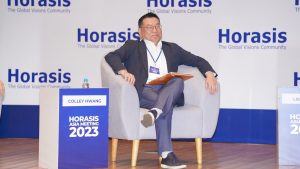
Colley Hwang, President & Chief Executive Officer, Digitimes, Taiwan, China
However, when discussing the effect of Asia driving the world’s economic transformation, the panelists were careful to widen the discussion away from Vietnam. For instance, Lisa Botos, Founding Partner, MMBP Private Partners, Singapore who is a cultural strategist specializing in media and art: stated she is adept at viewing any challenge through a multiplicity of lenses and believes that culture is an underutilized tool that when skillfully employed to tangible value to any organization. She affirms their successful clients seek cultural impact and relevance – both public and private – and want to participate meaningfully in creative endeavor, and to contribute to the collective good. Murat Seitnepesov, Chairman, Integral Group, Switzerland also agreed – the world of business, commerce and leisure is built on mutually-beneficial relationships, leveraging new technologies in order to enhance logistics, marketing, ecological health and prosperity.

Van Dang, Chief Executive Officer, Savvycom, Vietnam, one of the meeting co-chairs
It is important for Asian nations to discuss their respective strengths, weaknesses and needs as there is increasing tension between the US and China. Wang Dong, Executive Director, Institute for Global Cooperation and Understanding (iGCU), Peking University, China explained that as the relationship between China and the United States becomes increasingly complex and interdependent, leaders in Beijing and Washington are struggling to establish a solid common foundation on which to expand and deepen bilateral relations. Such discussions are not aided by the heightened and increasing numbers of tariffs, especially in high tech. Colley Hwang, President & Chief Executive Officer, Digitimes, Taiwan, China believes the focus of semiconductor industry operations in particular is changing. From 2023-2024, the tech industry will be driven by three key factors: semiconductors, the ICT supply chain, and AI-driven IoT (AIoT). Specifically, Michael Yeoh, President, KSI Strategic Institute for Asia Pacific, Malaysia acknowledged AI is “very disruptive” Asking further “how can we improve our skills and our technology together in order to weather the storm?” I don’t think any one country can do that. We don’t have enough resources – building trust, transparency and co-creation are key to “people-centered collaboration.” On a practical note, Yip Thy-Diep Ta, Co-Founder, J3d.ai Labs, Germany explained, “AI is changing nearly every industry and will impact society in ways we are just beginning to understand.” Van Dang, Chief Executive Officer, Savvycom, Vietnam noted that the pace of change has overwhelmed national, state and provincial governments around the world, he said. But at the community level, where government most closely touches people’s lives, there is hope. Digital services make it possible for communities everywhere to build dynamic economies, strong societies and affirming cultures – and to pass these assets on to the next generation. “And Binh Duong is one of the world’s intelligent smart cities,” concluded Cuong Dang, Partner and Chief Executive Officer, Forbes Vietnam, Vietnam.

Xiaoyin Qu, Founder, Run The World, USA
Johan Nyvene, Chairman, Ho Chi Minh City Securities Corporation, Vietnam noted there is a huge infrastructure difference between Asian countries – Singapore and Japan are ranked in the top-10; China (48th), India((85th), and, for instance Bangladesh is 132nd. Overall, the region asks for $20 trillion for development by 2030 vs the world’s demand for up to $50 trillion. This financial demand is a big ask when considering the many other requests for funding when nations face large budget deficits Singapore has a large public debt of 105.5% of GDP, somewhat below that of Japan having a 226% public debt against GDP: in comparison China (22%) and India (52%) public debt vs GDP.
On the other hand, in terms of GDP/capita the US leads by a large margin at $70k, China ($62k) and India ($11k) with Japan ($45k). Such large disparities make regional cooperation meetings fraught, even when considering that Public/Private financing is gaining in popularity across the region, concluded Alejandro Reyes, Senior Fellow, Centre for Contemporary China and the World, University of Hong Kong, Hong Kong.

Marjorie Yang, Chairman, Esquel Group, Hong Kong SAR, making a point on sustainable fashion
Climate change and its effects was the focus of one Plenary panel chaired by Mohamed Irshad, Head of Corporate Affairs for ASEAN, TCS, Singapore who noted he started volunteering at grassroots organizations, which exposed him to residents from underprivileged backgrounds. “That had a deep impact on me,” says Irshad. “I wanted to play a part in building bridges between different communities and helping those in difficult circumstances.” To do this, I learned it was very important to have capable people leading an organization. Climate change is owned by everyone, it is a complex phenomenon and needed competent players. Such as Claude Béglé, Chairman, SymbioSwiss, Switzerland. His company`s first mission was to design a Cleantech strategy for the city of Geneva, now its mission statement has widened to include public affairs at large, and in particular sustainability dealing with both private and public activities in the fields of infrastructure and smart cities, cleantech and academia. Tadahiro Kawada, President, Kawada Technologies, Japan agreed with the chair, and finds the Smart Cities a good approach to addressing climate change coupled with prosperity increase. Marjorie Yang, Chairman, Esquel Group, Hong Kong SAR agreed, “Sustainability is a fundamental problem of a consumer product-led company.” She considers the basis for change is education and has addressed the needs of upwards of rural households in China, essentially improving the standards of teaching, encouraging education and learning, and enhancing health and public hygiene in areas outside the regional capital.

Harry Hui, Founder and Managing Partner, ClearVue Partners, China
And thus, says Vinh Quang Dang, Senior Private Sector Specialist, The World Bank, Vietnam, education is a field with great potential for development. Vietnam has built many subjects related to supply chains, distance education programs, network administration, logistics – as “hot” fields of study. Herbert Chen Wu, Managing Director, The Economist Global Business Review, China noted the connection between schools and businesses that will create many initiatives and build skills to develop human resources with the capacity of wide and deep participation. “As are the needs of sustainability,” as Xiaoyin Qu, Founder, Run The World, USA, underlined. Eddie Thai, General Partner, Ascend Vietnam Ventures, Vietnam. “At the end of the day we need to nurture entrepreneurs,” concluded Harry Hui, Founder and Managing Partner, ClearVue Partners, China.
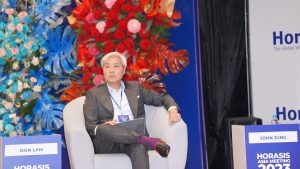
Don Lam, Chief Executive Officer and Founding Partner, VinaCapital, Vietnam
The closing plenary reviewed Asian growth and the need for co-ordination, though with an emphasis on Vietnam. Nguyen Quang Huan, Chairman, Halcom, Vietnam said climate change is bringing many disruptions and for a partially low-lying nation like Vietnam water management is important as its demand is rising rapidly as the population slowly increases and commercial ventures demand more water. Agnes VST Devanadera, President and CEO, Clark Development Corporation, The Philippines stressed the need for good public services based on her wide experiences which included time in Energy Regulation matters in the Philippines. A point well taken by Yoshito Hori, Founder and Chairman, Globis, Japan who stressed that most of Southeast Asia is currently becoming a Silicon Valley for startups. Don Lam, Chief Executive Officer and Founding Partner, VinaCapital, Vietnam agreed – noting, one of the key infrastructures that people aren’t talking about is renewable energy capacity. And at the moment, Vietnam is already planning to be triple our energy capacity by 2030 with solar and wind. And all the while, as Nguyen Quang Huan, Chairman, Halcom, Vietnam reminded us, a collaborative stakeholder economy would better allow people to transact and benefit.

Agnes VST Devanadera, President and CEO, Clark Development Corporation, The Philippines
Finally, closing the meeting, Vo Van Minh, Chairman, Bình Duong Province, Vietnam reminded all that the average median age in Vietnam is 32.8 years in 2023, which bodes well for the country’s future economic growth through 2050 and beyond. If the Government can successfully execute some of the major infrastructure requirements in the coming 5-7 years, Vietnam’s future is bright indeed. And as Chairman of the Bình Duong Provincial People’s Committee, Vo Van Minh pledged to bring all his abilities, wisdom, and enthusiasm to build a stronger and stronger government system from the province to the grassroots, operating effectively and efficiently.
I personally believe in a promising future for Asia. The continent has all the ingredients to become the world’s economic powerhouse. And it is my hope that the Horasis Asia Meeting will continue to serve as an important platform for stimulating thought and creative solutions. As you read the key points and recommendations presented in this report, we welcome your thoughts and suggestions as we prepare the programme for the next Horasis Asia Meeting.
